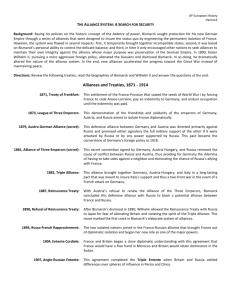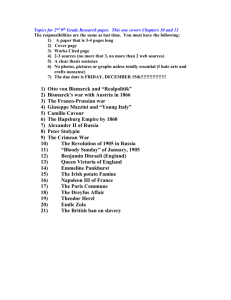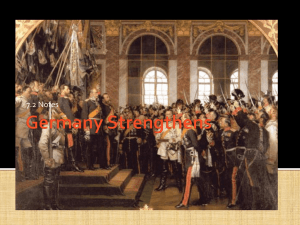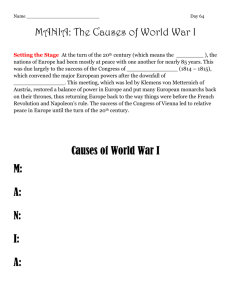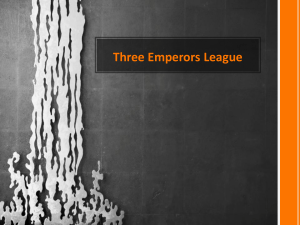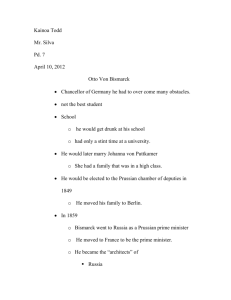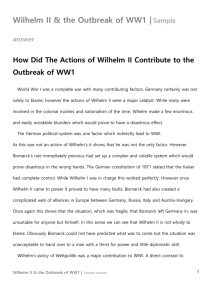German Foreign Policy |Sample answer
advertisement
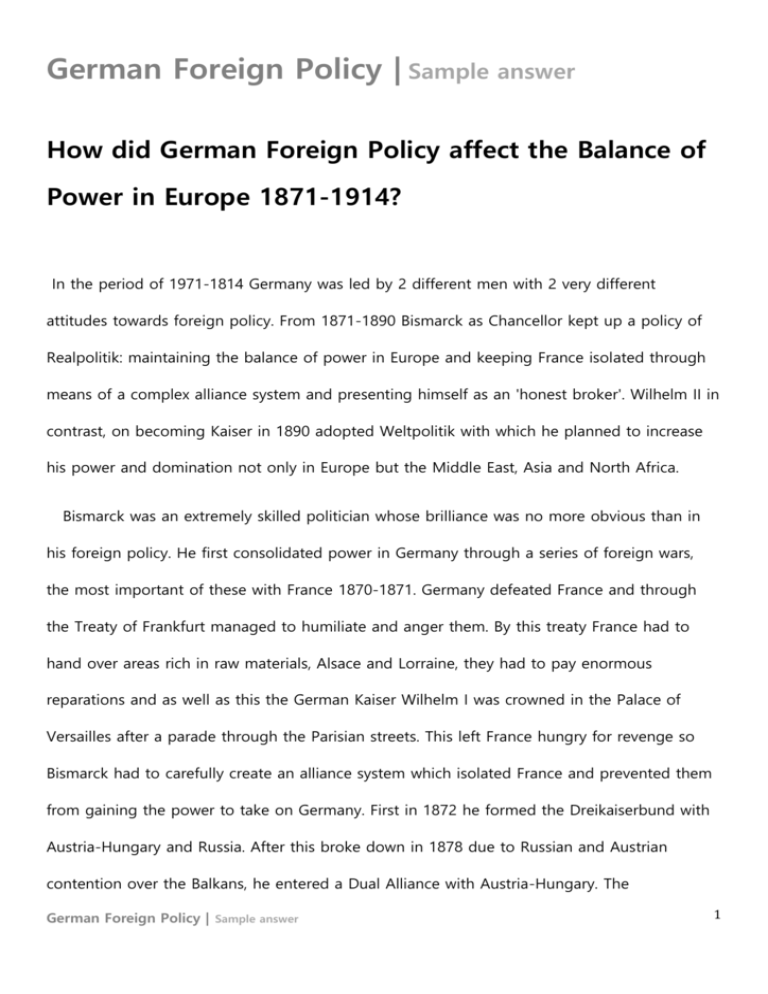
German Foreign Policy | Sample answer How did German Foreign Policy affect the Balance of Power in Europe 1871-1914? In the period of 1971-1814 Germany was led by 2 different men with 2 very different attitudes towards foreign policy. From 1871-1890 Bismarck as Chancellor kept up a policy of Realpolitik: maintaining the balance of power in Europe and keeping France isolated through means of a complex alliance system and presenting himself as an 'honest broker'. Wilhelm II in contrast, on becoming Kaiser in 1890 adopted Weltpolitik with which he planned to increase his power and domination not only in Europe but the Middle East, Asia and North Africa. Bismarck was an extremely skilled politician whose brilliance was no more obvious than in his foreign policy. He first consolidated power in Germany through a series of foreign wars, the most important of these with France 1870-1871. Germany defeated France and through the Treaty of Frankfurt managed to humiliate and anger them. By this treaty France had to hand over areas rich in raw materials, Alsace and Lorraine, they had to pay enormous reparations and as well as this the German Kaiser Wilhelm I was crowned in the Palace of Versailles after a parade through the Parisian streets. This left France hungry for revenge so Bismarck had to carefully create an alliance system which isolated France and prevented them from gaining the power to take on Germany. First in 1872 he formed the Dreikaiserbund with Austria-Hungary and Russia. After this broke down in 1878 due to Russian and Austrian contention over the Balkans, he entered a Dual Alliance with Austria-Hungary. The German Foreign Policy | Sample answer 1 Dreikaiserbund was established again in 1881 and the Dual Alliance extended to include Italy in 1882. At all times Bismarck insured that they were allied with at two major powers in Europe at any given time, while also making sure that France had no where to turn to form and alliance. Bismarck was careful to avoid any conflict with Britain so that they would remain in splendid isolation. This meant that at all times the balance of power was on Bismarck's side. Wilhelm II however proceeded to break down Bismarck's system entirely nearly from the moment he came into power. In 1892 he allowed the Reinsurance Treaty with Russia to end, believing his own personal relationship with the Tsar Nicholas II, his cousin, would be enough to prevent them from allying with France. He was grievously wrong. Feeling isolated and attracted by France's generous investments in projects such as the Trans Siberian Highway, they formed the Franco-Russian alliance. This presented Germany with the possibility of a two front war for the first time in 20 years. Wilhelm proceeded to form alliances with AustriaHungary and Italy. Then when Wilhelm's naval policy alarmed Britain they came out of splendid isolation, forming the Entente Cordiale with France and eventually an alliance with Russia too. This left 2 groups of the major powers in a stand off against one another, the Triple Entente of France, Britain and Russia and the Triple Alliance of Germany, A-H and Italy. Tensions were high between the 2 groups and each had a certain amount of power. The balance however was definitely tipped further away from Germany's favour than in the era of Bismarck's foreign policy. Another aspect of Bismarck and Wilhelm's foreign policy with developed during this period was colonialism. They had very different views where colonies were concerned. Bismarck saw colonies as expensive and realised that they contributed to international tensions. For this reason he didn't get involved in them. However due to pressure groups he eventually called German Foreign Policy | Sample answer 2 the Second Congress of Berlin in 1885 to divide Africa peacefully into different spheres of influence. Wilhelm on the other hand had a far less delicate approach to colonies. He wanted to extend Germany's influence and did so by colonising Kiaochow in China and building the Berlin-Baghdad railway. This conflicted with British interests in the west which was just one of Wilhelm's gaffes which led to Britain entering the Triple Entente. Colonialism clearly added to tensions and caused the balance of power to tip further away from Wilhelm, despite the initial appearance that it contributed to Germany's power. Another area which affected the balance of power at the time, which was also an issue for both Bismarck and Wilhelm was the Balkan Question. Russia and Austria-Hungary were constantly contesting for power over the Balkans. In 1878 Russia entered a war with Turkey and were victorious. They then took a large amount of land and allocated it as Bulgaria, of which they had primary control. A-H was unhappy with this arrangement and Bismarck called the First Congress of Berlin in 1878 to try and diffuse the problem. It was agreed that Russia would remove its influence from the Balkans. Russia was unhappy with this agreement and the Dreikaiserbund ended. However Bismarck was successful in avoiding a war between his 2 allies. Wilhelm on the other hand encouraged Austria to become more active in the Balkans, leading to further tensions between Russia and A-H. As these were members of opposite sides in Europe at the time this essentially led to further problems and once again German foreign policy shook up the balance of power. An enormous aspect of Wilhelm II's foreign policy which led to changes in the balance of power was his naval policy. In 1897 Admiral Von Tirpitz become head of the German navy and presented his 'Risk Theory'. From then on Germany began to rebuild its navy, with Iron Budgets beginning in 1898. Britain feeling threatened as they had traditionally always had German Foreign Policy | Sample answer 3 dominance over the sea, brought in a two power principle, that their navy should be as powerful as the next 2 largest combined. In 1904 British Admiral John Fisher invented the HMS Dreadnought, the first all big gun warship. Germany followed in 1907, leading to an arms race. By 1914 Germany had 17 Dreadnought and Britain 29. British naval spending from 1898-1914 went from 9.8 million to 47.4 million. German spending went from 2.4 million to 22.4 million in the same period. Undoubtedly this naval policy was a huge factor in Britain's decision to leave splendid isolation, leading to the Triple Entente, which effected greatly the balance of power in Europe at the time. Wilhelm II also made a number of mistakes in his foreign policy which increased tensions and further affected the balance of power. The Kruger Telegram following the British embarrassment of the Jameson Raid for example increased tensions between Britain and Germany. The first and second Moroccan crises also served to further unify Britain and France while also showing that Italy was unreliable as an ally. Each of these pushed all countries further into their alliances and the balance of power spun further out of Wilhelm's control. The German foreign policy in this period had 2 very different styles. However the end result was of an arguably weaker Triple Alliance facing the Triple Entente, with tensions high between them. Weaker countries felt that they could act with less caution and be backed up by their more powerful allies. This eventually led to the disaster of WW1. During Bismarck's time as Chancellor Germany always held a position of power in Europe due to valuable alliances. Wilhelm however didn't see the benefits of maintaining this balance of power and in the end Germany ended up in a weaker situation than before when entering a world war. German Foreign Policy | Sample answer 4

